Edie Melson's Blog, page 8
July 23, 2025
Where in the World Are We? How to Write an Engaging Story World
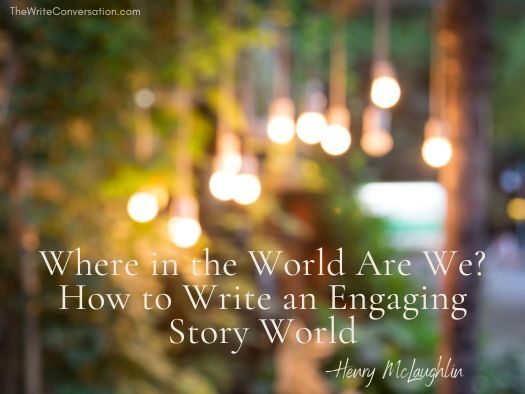
by Henry McLaughlin @RiverBendSagas
I think our story world is one of the more subtle areas of writing and one we frequently pay less attention to. We focus on our plot and building our characters but don’t approach the time and place of the story as fervently.
World building is creating the world or setting of our story. Where does the action take place? When does the action take place? One of the early lessons I learned in writing, especially fiction, is to keep the reader anchored in time and place.
Is it a spaceship sailing 500 years from now? Or is it Jules Verne or C. S. Lewis—science fiction written from their unique perspectives?
Is it a sailing ship crossing the Atlantic 400 years ago bringing pilgrims to the New World? Or is it a cruise ship flipped upside down by a storm or struck by an iceberg?
Is it contemporary Fort Worth or Dodge City in the 1880s?
Is it an entirely fictional world like Middle Earth?
Are we writing crime novels, suspense, thrillers, mysteries? Any of these genres requires a unique approach to creating story worlds. Read the early writers like Hammet, Chandler, and Dorothy Sayer. Read the contemporary authors like Jacqueline Winspear and Bob Dugoni.
And no matter your genre or story world, you will need to do research either before you start or after each draft. Study the actual history of your story world and read historical novels set in the period of your story and assess the accuracy and the believability of your version of the world.
No matter where or when we set our story, it must be believable, and it must be something the reader can visualize and imagine the characters interacting with. The more we can make the setting a character in our story, the more solid and engaging it will be. Think of the movie The Perfect Storm, or Andy Weir’s novel, The Martian. For an interesting use of story world, watch The Martian Child which explores Earth through the eyes of a young boy who thinks he’s from Mars.
One of my favorite authors to study for world building is Orson Scott Card. His science fiction, fantasy novels, and alternative history stories show how to build a believable world and make it a character. He has written a craft book I recommend in almost every class I teach and to every author I mentor. It’s called How to Write Fantasy & Science Fiction (Writer’s Digest Books, 1990). It is a priceless resource in how to write in any genre.
Jacqueline Winspear writes mysteries set in England in the years following World War One into World War Two. Her story world is not only accurate it is also consistent across twenty novels. And her characters change and age and grow as the years pass and world-shaking events happen.
Another factor to consider is your story world is not static. It changes and grows as your story develops and you learn new things about your characters and your plot.
And remember, each character’s interaction with your story world is different. The same world but seen from different points of view. One character may see your beautiful tropical island as peaceful and serene, heaven on earth. Another may see the same island as hostile and threatening, filled with poisonous plants and dangerous animals. How they see the world of the story affects how they respond to the obstacles they face and their interactions with other characters.
For a fish-out-of-water angle, read the Jesse Stone novels by Robert B. Parker. Jesse moves from being a detective in sprawling Los Angeles to being the chief of police in a small town in Massachusetts. Talk about culture shock!
What are some of your favorite resources for building a story world?
TWEETABLEWhere in the World Are We? How to Write an Engaging Story World from Henry McLaughlin (@RiverBendSagas) on @EdieMelson (Click to Tweet)
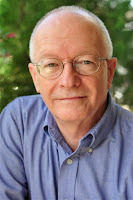 Henry’s debut novel, Journey to Riverbend, won the 2009 Operation First Novel contest.
Henry’s debut novel, Journey to Riverbend, won the 2009 Operation First Novel contest.Henry edits novels, leads critique groups, and teaches at conferences and workshops. He enjoys mentoring and coaching individual writers.
Connect with Henry on his BLOG, X (TWITTER) and FACEBOOK.
Published on July 23, 2025 22:00
July 22, 2025
English is a Linguistic Melting Pot: A Word-Lover’s Guide to Borrowed Beauty

by DiAnn Mills @DiAnnMills
When we write in English, we’re borrowing from a vast world of languages. English is a hybrid, shaped over centuries by conquests, trade, exploration, and cultural exchange. This gives writers a palette of amazing and descriptive choices from an array of loanwords.
English evolved from Old English or Anglo-Saxon roots, but many other words came from French, Latin, Norse, and the other countries that influenced the English language. Fascinating!
I picture an English person hearing a new word, liking what it means, enjoying the way it rolls off his tongue, and adopting it as his own. His meaning may not be exactly what was intended by the mother language, but he adopted it and added his personal touch. My friends, that is exactly how our language developed.
A List of Some Words We’ve Pulled From Other Languages
French: From this source come many refined or formal words.Attorney, ballet, bureau, bureaucracy, cuisine, façade, genre, government, rendezvous.
Latin: These root words are used in many academic, legal, and scientific terms.Agenda, auditorium, authority, data, mortal, precise, status, transmit, versus, verbatim.
Germanic or Anglo-Saxon also called Old English.Bread, earthiness, fight, home, house, king, love, simplicity, strong, water
Norse or Old Norse from the Vikings. Awkward, egg, knife, sky, them, they, thrift, window
Greek: Many of these words are used in science and technology.Antique, democracy, dialogue, echo, economy, grammar, geography philosophy, psychology
Arabic: Words from Arabic often relate to science, math, and trade.Alcohol, algebra, cotton, elixir, sugar, tariff, zenith
Hindi or Persian: These words appear in administration, trade, and culture.Shampoo, bungalow, pajamas, guru, juggernaut, karma, veranda
Indigenous and Other World Sources: The English language also borrowed many of these words to show specific cultural distinction.Canoe (Arawakan), chocolate (Nahuatl), hammock (Taíno), kayak (Inuit), kangaroo (Guugu Yimithirr), tobacco (Arawakan)
When we use English, we are word travelers. Our choices take us on an adventure. We can enjoy an exploration of different cultures, people, and various root derivatives and meanings from the original language. The search helps us deepen our understanding of words and adds credibility to our writing. Oh, the places we can go when we grasp the English language.
I find the study of semantics—the study of language perfect for a word nerd like me. How about you?
TWEETABLEEnglish is a Linguistic Melting Pot: A Word-Lover’s Guide to Borrowed Beauty from @DiAnnMills on @EdieMelson (Click to Tweet)
 DiAnn Mills is a bestselling author who believes her readers should expect an adventure. She creates action-packed, suspense-filled novels to thrill readers. Her titles have appeared on the CBA and ECPA bestseller lists; won two Christy Awards; and been finalists for the RITA, Daphne Du Maurier, Inspirational Readers’ Choice, and Carol award contests.
DiAnn Mills is a bestselling author who believes her readers should expect an adventure. She creates action-packed, suspense-filled novels to thrill readers. Her titles have appeared on the CBA and ECPA bestseller lists; won two Christy Awards; and been finalists for the RITA, Daphne Du Maurier, Inspirational Readers’ Choice, and Carol award contests. She is the former director of the Blue Ridge Mountain Christian Writers Conference, Mountainside Marketing Retreat, and Mountainside Novelist Retreat with social media specialist Edie Melson. Connect here: DIANNMILLS.COM
Published on July 22, 2025 22:00
July 21, 2025
Dipping the Quill Deeper: Draining to Dry
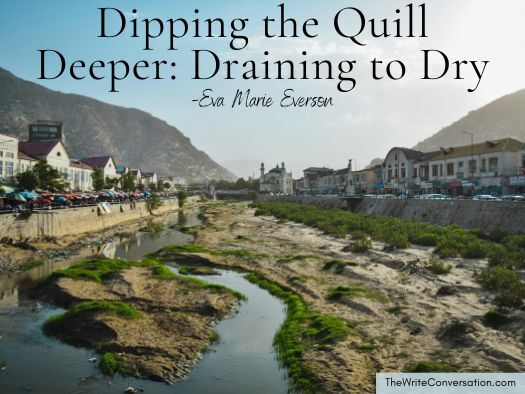
by Eva Marie Everson @EversonAuthor
Henri Nouwen was born in the Netherlands in 1932. His father was a lawyer, his mother a bookkeeper. In 1957, at the age of 25, the Catholic church ordained him as a priest. Throughout his ministry, he used psychology as a means of exploring the human side of faith, which he felt was overlooked. He struggled with his own humanity but stayed true to his vows to the Church and to God.
During his lifetime and ministry, Nouwen wrote nearly 40 books and hundreds of articles. When we read his work today, one cannot help but feel the deep love of Nouwen toward Jesus and Jesus's deep love toward Nouwen.
Toward us.
In his book, A Cry for Mercy, which is a book of prayers that “reveals a fearful heart, a cry for mercy, rays of hope, the power of the Spirit, the needs of the world, and finally gratitude," Nouwen pens these words:
O Lord Jesus Christ, Son of the Living God, have mercy on me, a sinner. I am impressed by my own spiritual insights ... I have read many books about the Christian life, and have even written a few myself. Still, as impressed as I am, I am more impressed by the enormous abyss between my insights and my life.
It seems as if I am standing on one side of a huge canyon and see how I should grow toward you, live in your presence and serve you, but cannot reach the other side of the canyon where you are. I can speak and write, preach and argue about the beauty and goodness of the life I see on the other side, but how, O Lord, can I get there? Sometimes I even have the painful feeling that the clearer the vision, the more aware I am of the depth of the canyon.
Am I doomed to die on the wrong side of the abyss? Am I destined to excite others to reach the promised land while remaining unable to enter there myself? ... I can only keep trying to be faithful, even though I feel faithless most of the time. What else can I do but keep praying to you, even when I feel dark; to keep writing about you, even when I feel numb to keep speaking in your name, even when I feel alone. Come, Lord Jesus, come. Have mercy on me, a sinner. Amen.
As a Christian writer, have you ever felt the same as Nouwen? Have you ever felt that you give and give and give through your writing--all truth, the deepest truth--but that you, yourself, have drained to dry?
This is often because we do give but fail to receive. Perhaps we think that we, as literary authorities on such things as faith, prayer, spiritual life, etc., cannot admit to needing . . . anything. We are like cars that we gas up for a trip and then we drive and drive them without stopping. The "need a coffee break?" icon pops up on our dashboard, but we don’t stop. The warning that we are low on gas . . . getting lower . . . getting lower . . . now riding on reserve . . . on fumes . . . on . . . nothing pops up and dings. Loudly.
In fact, we are now on the side of the road, useless.
But all we need is . . . fuel. Simple as that. Find the station, unscrew the gas cap, insert the nozzle, and squeeze.
How do you, as a Christian writer, re-fuel? How do you keep from draining to dry?
TWEETABLEDipping the Quill Deeper: Draining to Dry from @EversonAuthor on @EdieMelson (Click to Tweet)
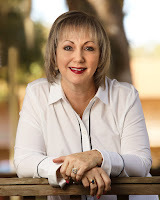 Eva Marie Everson is the CEO of Word Weavers International, the director of Florida Christian Writers Conference, and the contest director for the Blue Ridge Mountains Christian Writers Conference. She is the author of almost 50 books, both fiction and nonfiction. Her next novel, Beth Bettencourt, is set for release in 2026 (Kregel). To know more about Eva Marie (or to be added to her Southern newsletter), you can connect with her at www.EvaMarieEversonAuthor.com
Eva Marie Everson is the CEO of Word Weavers International, the director of Florida Christian Writers Conference, and the contest director for the Blue Ridge Mountains Christian Writers Conference. She is the author of almost 50 books, both fiction and nonfiction. Her next novel, Beth Bettencourt, is set for release in 2026 (Kregel). To know more about Eva Marie (or to be added to her Southern newsletter), you can connect with her at www.EvaMarieEversonAuthor.com
Published on July 21, 2025 22:00
July 20, 2025
What to Include in Your Author Newsletter
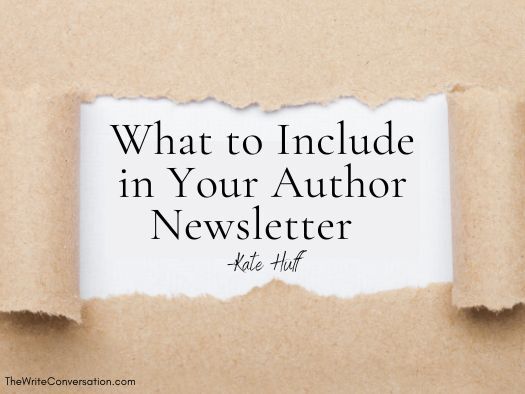
by Kate Huff @KateOlivaHuff
You’ve finally gotten used to the idea that you do need a newsletter, even if you’re pre-published. You understand the importance of nurturing your subscriber list, and you’re ready to get started. But then a moment of panic sets in…
What do I put in a newsletter that someone will actually want to read?
If that feels familiar, you’re not alone! I’ve had to wrestle with the same question. Why would someone want to read my newsletter when I don’t even have a book to sell?
Thankfully, there is good news. People will want to read your newsletter! And it doesn’t need to be long or complicated—it just needs to serve your reader.
How you serve them is up to you. But every time you write, aim to bring value to their day. Showing up with intention makes a difference.
Here are a few simple building blocks to guide you when you feel stuck or have looked at a blank screen for far too long.
6 Tips on Things to Include in an Author Newsletter1. A Personal Note: Start with something warm and relatable. What’s going on in your world? Readers love behind-the-scenes moments. What are you reading, writing, or baking? (Yes, sourdough counts!) As a reader myself, I enjoy discovering what my favorite authors are doing. Photos are always a plus. Consider this section as a friendly catch-up with a reader, not a formal update. Be yourself!2. Writing Updates: Whether you’re outlining, editing, or waiting for agent feedback, bring your readers along for the ride. You don’t need to overshare, but a simple update makes them feel included. Even “Oops, I haven’t written much this month” is worth sharing. It’s real and relatable.3. Book Recommendations: People trust you and your taste. Recommending books you love, especially those in your genre, will help position you as someone who knows the space. As an author, you should always be reading in your genre, so this shouldn’t be too hard. It’s also a powerful way to build community with other authors.4. A Peek into Author Life: What’s your workspace look like? Have a mood board, character sketch, or playlist you write to? Share it! Don’t overthink it. These small glimpses turn your story into an experience, not just a product. And they help build a loyal audience that’s invested in your journey.5. Something Signature to You or Your Genre: Add a little something you. I love fairytales, so each month I include a quick, themed connection with fairytales. (Want to know what that looks like? Sign up for my newsletter! Shameless plug.) What’s something specific to your brand, your writing voice, and your niche that you could weave in? 6. A Reader Invitation/Call to action: Give your audience a way to engage with you. Ask simple questions. Invite your readers to reply, follow you on social, preorder your book, or forward your email to a friend who’d like your work. Always include clickable links. (Those clicks will tell you what your readers like and don’t like!)
A word of encouragement.
You don’t have to include all of these sections; they are building blocks. What works best for you and your readers? Start with one or two blocks and adjust as needed as you discover what is attainable for you. Remember, the best newsletter is the one that’s sent, not the almost perfect one sitting in your outbox.
The most important thing is to show up. Your newsletter is a conversation, not a checklist. And every email you send builds trust with the people who’ve already said yes to hearing from you. That’s a gift!
Next time you sit down to write your newsletter, don’t ask:
“What should I say?”
INSTEAD, Ask:
“What would I love to tell a friend?”
And then write that.
TWEETABLEWhat to Include in Your Author Newsletter from @KateOliviaHuff on @EdieMelson (Click to Tweet)
 Kate Huff is a storyteller at heart and loves finding Gospel elements in all stories, especially fairytales. She believes fairytales that explain the Gospel in clear and captivating ways have the power to change the world, one person at a time. Her first manuscript is currently with an agent, and she’s working on her second fiction novel along with a few non-fiction projects.
Kate Huff is a storyteller at heart and loves finding Gospel elements in all stories, especially fairytales. She believes fairytales that explain the Gospel in clear and captivating ways have the power to change the world, one person at a time. Her first manuscript is currently with an agent, and she’s working on her second fiction novel along with a few non-fiction projects. Kate works as a freelance content writer and newsletter specialist. She has over twenty years of experience crafting content, specifically newsletters, across diverse sectors, including non-profits, sales, and fundraising. She helps authors and entrepreneurs create compelling newsletters that connect with their audiences and offers tailored content creation services, as well as training on how to build newsletters and grow subscriber bases.
You can find her at www.kateoliviahuff.com or on most socials as @kateoliviahuff. Sign up for Newsletters Made Simple for Authors at https://rebrand.ly/Newsletters-Made-Simple for simple tips to take your newsletter from good to great!
Published on July 20, 2025 22:00
July 19, 2025
Move Past Writer's Block and Get Started Writing With These 8 Valuable Tips

by Tammy Karasek @TickledPinkTam
Have you been in the situation where a writing deadline loomed on your calendar a short- few-days away and nary a paragraph was accounted for on a page? Whether those deadlines are self-imposed or set by someone else for you, they seem to nag and agitate you until you get that piece done. Or worse, you panic and freeze.
We sit down to write but can’t think about what we want to say. Why can’t we get started? It’s not fair that the words flood our minds while in the shower or when we’re in a car in super busy traffic. Or the dreaded time—and my worst nemesis—as soon as my head touches my pillow at night.
Why won’t the words come when needed? I believe it’s because the writing I feel we’re called to do, is what the Lord wants us to share. Which means the enemy isn’t happy with that and will put major distractions in our paths every chance he gets. Unfortunately, he often succeeds as he has done for me this summer. In a big way.
So, what is a poor writer to do? No, seriously—I am asking you!
Below is a list of eight ways I try to overcome those times I’ve sat staring at the blinking cursor. That flashing vertical line that taunts and mocks me. I hope the tips below help you.
8 Ways to Help Writers Get Started Writing Again1. Pray. Of course, it’s the obvious one to start with, but if I’m honest, when stressed in this situation, I often charge in and hope words will pour over me out of my wishing them to do so. Instead, I need to pray to the one who can fix this. 2. I have one calendar that I log all my writing jobs on and what days they are due. With them written down, I can see at a glance what pieces are coming up and if I’ve already made a note or two about the title or topic.3. I’ve created an Excel log sheet I use for pertinent information for each piece I’ve committed to, such as: title, date due, date I sent, where to send, and any guidelines for the piece. I can look over topics I’ve already written and often another idea will come to my mind based on a previous article or blog post. 4. I look ahead a couple of weeks to see what’s coming. Not only for the pieces I’m writing, but also what is scheduled outside of my writing life. Maybe something will be due during a very heavily scheduled week, this pushes me to get a start on it so I don’t run out of time—not like that’s ever happened! We all need margins of time built into each week or day for the “other” parts of life that could and will happen. 5. I’ve carried a small pocket tablet in my purse for many years which makes it easy to write in at the red light. Before I back out of the garage, I put it in the cupholder. Or I will sometimes use my voice memo on my iPhone. Once back at that blasted, blinking cursor that aggravates me, I pull out my notes and transfer the new info to the top of the blank page to get me started. Once I get going, I’ll go back and delete that note out of the way. 6. At the start of my writing sessions, I open a Word document I’ve titled, Brain Dump. It’s a continual list of thoughts that have come to me about my current project or possible future ones. It could be a scene idea or something I’ve thought of that I want to go back and change. But before I start writing, I scroll through the notes still there. Often there is something I need to change in a scene or even a note to find the scripture I was looking to add to a devotion I had written. Once done, I delete that note. Then I put the document down on the dock on my computer. If during my writing time something pops in my head, I can quickly pull up the list and empty my mind so I won’t forget it. Nor will I lose the momentum on the piece I’m working on at the moment. 7. I now use a cute kitchen timer to challenge myself with word sprints. I write down a word count number, set the timer for twenty minutes, and take off writing—unedited—until the timer goes off. It might be 500 words of mush, but when you edit, you will surprise yourself and find great golden nuggets to add to your WIP. Also, this little timer has been helpful for setting a time limit for surfing social media, too. Just saying! Wait, please tell me I’m not the only one with that issue.8. I’m grateful for my writing partners who have been fantastic to hold me accountable in my writing. To know they will ask is often the incentive I need to push through. Ask a writing friend to be an accountability partner to keep you writing, too.
I won’t lie to you and tell you I’ve mastered any of the eight items above, but I am closer to a solid routine that works for me. I do like to read what works for other writers and I often give them a try for myself. I encourage you to seek what will get you into that funky, cool writing groove that is uniquely yours.
If you’ve come up with a great idea or two to keep you writing, we’d love for you to share with the rest of us. Do tell!
TWEETABLEMove Past Writer's Block and Get Started Writing With These 8 Valuable Tips from @TickledPinkTam on @EdieMelson (Click to Tweet)
 Tammy Karasek uses humor and wit to bring joy and hope to every aspect in life. Her past, filled with bullying and criticism from family, drives her passion to encourage and inspire others and give them The Reason to smile. She’s gone from down and defeated to living a “Tickled Pink” life as she believes there’s always a giggle wanting to come out! A writer of Romance—with a splash of sass. She’s also The Launch Team Geek helping authors launch their books and also a Virtual Assistant for several best-selling authors. Don't miss her recent book, LAUNCH THAT BOOK, just released in November.
Tammy Karasek uses humor and wit to bring joy and hope to every aspect in life. Her past, filled with bullying and criticism from family, drives her passion to encourage and inspire others and give them The Reason to smile. She’s gone from down and defeated to living a “Tickled Pink” life as she believes there’s always a giggle wanting to come out! A writer of Romance—with a splash of sass. She’s also The Launch Team Geek helping authors launch their books and also a Virtual Assistant for several best-selling authors. Don't miss her recent book, LAUNCH THAT BOOK, just released in November. Her work was also published in a Divine Moments Compilation Book—Cool-inary Moments. She’s also the Social Media Manager for the Blue Ridge Mountains Christian Writers Conference, Founding President and current Vice-President of ACFW Upstate SC, and Founding President of Word Weavers Upstate SC. She’s a writing team member for The Write Conversation Blog, Novel Academy, MBT Monday Devotions, The Write Editing and more. Connect with Tammy at HTTPS://WWW.TAMMYKARASEK.COM.
Published on July 19, 2025 22:00
July 18, 2025
Encouragement to Remember that My Actions and Choices Have Consequences for Other Writers
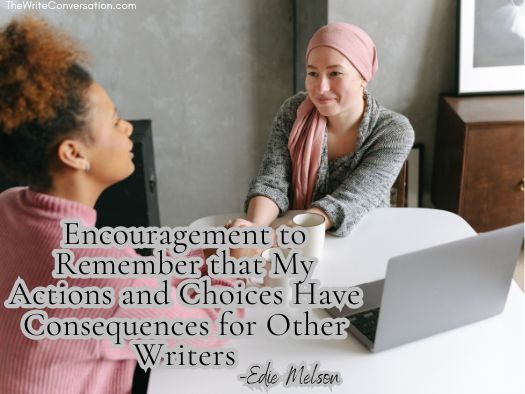
by Edie Melson @EdieMelson
For if anyone thinks he is something when he is nothing, he deceives himself. Galatians 6:3
I am incredibly privileged to direct the Blue Ridge Mountains Christian Writers Conference. As much as I LOVE what I do, this conference is always a blessing, and a trial for me to attend. A blessing because I get see first-hand the way God is using His people to impact the world. I also get to witness incredible acts of selflessness and encouragement. I always see multiple examples of grace in action.
Here, seasoned writers encourage, teach and network with those who are still working hard to get started on their publishing dreams. It seems everywhere I turn I see someone putting others ahead of themselves. I watched one generous writer give away her coveted editor appointment to another writer, and as a result the recipient moved several steps closer to her publishing goal. Beyond that, during the conference it's normal to see knots of attendees huddled together, praying for one another or celebrating good news.
The trial comes when I see the other side of human nature. In the stress-filled environment of a conference some revert to a more selfish way of carrying on. Their conversation tends to consist more of I and me, instead of you and yours. Even worse, their actions are subtly orchestrated to remind those around of their importance and yes, greed. The hardest thing about encountering this, is how obvious it is to everyone around.
So what do I do when I witness these sorts of situations? I Pray. I’ve discovered the first thing I need to do is pray—for myself. I Remind Myself of Me. I use it to remind me to be on guard against self-centeredness within my own heart. Because I guarantee you it’s there, even if I’ve managed to conquer it for the moment. I Create a Mental Signpost. I let the behavior I observe be a subtle warning, pointing to the fact that none of us is perfect and we all must work to react in a giving and grace-filled manner.
Each of us is capable of great compassion and great selfishness. It only takes a split second to choose, but our choices always carry far-reaching consequences. My prayer is that I will always stop and listen to the Spirit's guidance, instead of choosing my own wants and perceived needs.
What amazing things have you seen so far this year during conference season? I'd love for all of us to be encouraged, so leave your thoughts in the comments section below.
Don't forget to join the conversation!Blessings, Edie
TWEETABLEEncouragement to Remember that My Actions and Choices Have Consequences for Other Writers from @EdieMelson (Click to Tweet)
 Edie Melson is a woman of faith with ink-stained fingers observing life through the lens of her camera. No matter whether she’s talking to writers, entrepreneurs, or readers, her first advice is always “Find your voice, live your story.” As an author, blogger, and speaker she’s encouraged and challenged audiences across the country and around the world. Her numerous books reflect her passion to help others develop the strength of their God-given gifts and apply them to their lives. Connect with her on her website, through Facebook, Twitter and Instagram.
Edie Melson is a woman of faith with ink-stained fingers observing life through the lens of her camera. No matter whether she’s talking to writers, entrepreneurs, or readers, her first advice is always “Find your voice, live your story.” As an author, blogger, and speaker she’s encouraged and challenged audiences across the country and around the world. Her numerous books reflect her passion to help others develop the strength of their God-given gifts and apply them to their lives. Connect with her on her website, through Facebook, Twitter and Instagram.
Published on July 18, 2025 22:00
July 17, 2025
Social Media Changes, But Our Call to Write Keeps Us Connected

by Edie Melson @EdieMelson
Do you remember when all we had to do was post a beautiful graphic with a Bible verse and watch the engagement happen? Not anymore. Sometimes, even heartfelt posts sometimes fall flat. Before we pull back the curtain on what’s changed — not just in platforms, but in how readers connect — and discover how we can still show up meaningfully, let’s talk about the unchanging part of our calling—God!
Every good gift and every perfect gift is from above, coming down from the Father of lights, with whom there is no variation or shadow due to change. James 1:17 ESV
How do we reconcile God’s unchanging nature with a calling that is constantly requiring us to pivot?
God is the same yesterday, today, and tomorrow. His priorities never change and neither does His character. HOWEVER, God is a God of surprises and He delights in doing new things through us and around us that reinforce Who He is.
Behold, I am doing a new thing; now it springs forth, do you not perceive it? I will make a way in the wilderness and rivers in the desert. Isaiah 43:19 ESV
So, the very first thing I try to remember when I get frustrated with social media is my why. Why am I bothering with connecting online?
Each of us has a slightly different why and we need to start there and be able to articulate our personal reason.
My why is two-fold:Be a light in the darkShare God’s love with those who don’t know Him.
So for me, the darker social media gets, the stronger my call to stay there. The harder it gets is something I use to fuel my commitment to reach others. I take it as a personal war—instigated by the enemy—to silence me and keep me from fulfilling my calling.
That makes me more determined than ever to figure this out—and work from God’s eternal perspective—with His priorities.
Changing Our Social Media Perspective
What if we worked from the Philippians 4:2 perspective for social media? Do nothing from selfish ambition or conceit, but in humility count others more significant than yourselves.
Consider how our goals would change if we measure success from God’s perspective instead of the world’s?We would find joy as God is pleased with our obedience
We would find contentment as we walk in the strength of our part in God’s plan
We would find peace as we let go of the things that are not our responsibility
Here’s how I think things might go if we followed God’s path:
God would inspire us and we would obediently set down our words—sometimes spoken, sometimes written, sometimes set to music, sometimes through video.We would obediently let people know about our message—websites, podcasts, manuscripts, speaking.We would trust God to do HIS PART—guide us to the agent we need, who will find the publisher God chooses. We would NOT worry and stress and strive for numbers or position.We would NOT fall for the lie that we are entitled to a publisher or to a certain level of visibility.We would NOT allow envy, jealousy, or competition to enter our hearts and dominate our actions.We would serve the people God sets before us. Whether we have one or one thousand, we will be obedient. We follow the purpose of our message as we share with those God sets before us. This doesn’t mean we don’t use the tools God has given us. We can trust God to do His part, but we must also do ours. And part of that is learning to use those tools.Social mediaMarketingSpeakingBloggingWritingProposal writingAmazon interfacesEverything else we have to doWe would pray for the people who are currently reading our words and interacting with us.
This actually fits in with the trends we are seeing in social media today. Here is just some of what we’re seeing:Algorithms now prioritize entertainment and ENGAGEMENT over encouragementInspiration alone doesn’t spread; engagement is kingPersonal can be throttled — unless you're paying or constantly postingOrganic growth is slower for authors unless we pivotCommunity has moved off the feed (to DMs, groups, email, etc.)
Bottom Line
I know your anxiety and your thoughts as you read this. I can hear you telling me publisher and agents tell us we MUST have the numbers to get the contracts.
And yet we must remember it is God and only God who decides the reach our words have.
We cannot expect to be the one who dictates where our words and our message lands.
God is able to do what He says He will:
For by grace you have been saved through faith. And this is not your own doing; it is the gift of God, not a result of works, so that no one may boast. 10 For we are his workmanship, created in Christ Jesus for good works, which God prepared beforehand, that we should walk in them. Ephesians 2:8 – 10 God didn’t save us for fame and fortune. God didn’t call us to get richGod called us to the works HE ordained before the beginning of the world!
Consider this passage as it pertains to publishing and speaking:
I planted, Apollos watered, but God gave the growth. 7 So neither he who plants nor he who waters is anything, but only God who gives the growth.8 He who plants and he who waters are one, and each will receive his wages according to his labor. 9 For we are God's fellow workers. You are God's field, God's building. 1 Corinthians 3:6 – 9
It takes a community to bring our words to the world. Our part is simply obedience. We write the words, make the connections, learn the tools, and allow God to work. And then we rest in the fact that God will do what He says and in a way that blesses us—and everyone who reads our words.
Now it's your turn. How do you cope when there is yet another change to social media and online connections? Be sure to leave your thoughts in the comments section below.
Don't forget to join the conversation!Blessings, Edie
TWEETABLESocial Media Changes, But Our Call to Write Keeps Us Connected @EdieMelson (Click to Tweet)
 Edie Melson is a woman of faith with ink-stained fingers observing life through her camera lens. She’s a writer who feels lost without that device & an unexpected speaker who loves to encourage an audience. She also embraces the ultimate contradiction of being an organized creative. She knows the necessity of Soul Care and leads retreats, conferences & workshops around the world on staying connected to God. Her numerous books, including the award-winning Soul Cares eries & reflect her passion to help others develop the strength of their God-given gifts. Her blog, The Write Conversation is recognized as one of the top 101 industry resources.
Edie Melson is a woman of faith with ink-stained fingers observing life through her camera lens. She’s a writer who feels lost without that device & an unexpected speaker who loves to encourage an audience. She also embraces the ultimate contradiction of being an organized creative. She knows the necessity of Soul Care and leads retreats, conferences & workshops around the world on staying connected to God. Her numerous books, including the award-winning Soul Cares eries & reflect her passion to help others develop the strength of their God-given gifts. Her blog, The Write Conversation is recognized as one of the top 101 industry resources. She and husband Kirk have been married 40+ years and raised three sons. They live in the foothills of the Blue Ridge Mountains and can often be found hiking—with Edie clinging to the edge of a precipice for the perfect camera angle and Kirk patiently carrying her camera bag and tripod. Connect with her on her website, WWW.EDIEMELSON.COM and through social media.
Published on July 17, 2025 22:00
July 16, 2025
Book Launch Basics: A Step-by-Step Guide for Authors
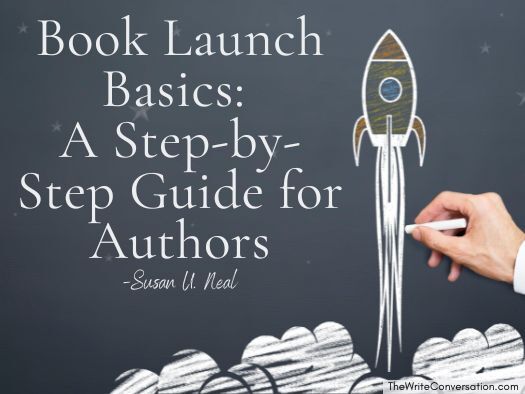
by Susan U. Neal @SusanNealYoga
Launching a book takes more than just uploading it to Amazon and saying a prayer (though prayer is certainly part of the process!). A successful book launch is strategic, layered, and rooted in connection—with readers, influencers, and platforms that help your message reach your reader. Whether you're a first-time author or a seasoned writer, this overview of book launch basics will help you cover all the essential elements.
Start with Your Website
Your website is your online home. It should be updated and ready before your book is released.Lead Magnet & Email ListDo you offer a free gift (lead magnet) to encourage visitors to subscribe to your email list? If not, create one tied to your book’s message. Once they subscribe, start an automated welcome email sequence to build connection. (See my lead magnet and email marketing courses through Christian Indie Publishing Association (CIPA) at CIPA.Podia.com.)
Boost Your Domain AuthorityCheck your website’s domain authority using Moz’s free tool. A higher domain authority means more visibility on Google. If your score is under 20, take action by writing guest blogs, magazine articles, and being interviewed on podcasts so your website has more links to it on the web.
Optimize Categories and KeywordsOne of the most strategic steps is ensuring your book is placed in the right Amazon categories along with strong keywords. Take the course “Determine Your Most Strategic Categories and Strongest Keywords” on CIPA’s site to help your book rank higher on Amazon.
Add Your Book to Your WebsiteOnce your book is finalized, add it to one of your website pages. Include a description, endorsements, media kit, and purchase links.
Marketing through Media, Blogs, and Beyond
In my book, How to Sell 1000 Books a Month, I suggest an author markets based upon their personality. Introverts would probably prefer to write guest blogs and magazine articles. Whereas extroverts thrive off of being interviewed on podcasts, radio, and television shows. Here's a roadmap to help you decide what works for you:Pray for DirectionAsk the Lord to guide your path. He knows which doors to open.
Craft Your Media PitchPractice your media pitch—why should a host interview you? Create a list of ten interview questions. Highlight how your book meets a reader’s felt need.
Podcasts & InterviewsJoin Podmatch.com to connect with podcast hosts (CIPA members receive a discount to Podmatch). Also download the List of 100+ Radio and Podcast Media from CIPA to begin pitching for interviews.
Create a Press KitBuild a media page on your site with previous interviews. Include your book cover, bio, social media links, interview questions, and downloadable headshots. Here's an example: Susan's Press Kit.
Guest Blogging with StrategyWhen you blog for other websites, you reach a whole new readership. Schedule a monthly guest blog during the first six months of your book’s release. Include a link to your lead magnet, book, and website in your bio.
Track Your AppearancesKeep a Word document by year, listing every podcast, TV show, or blog you’ve been featured in. This document will help you find the link a couple years down the road.
Book Blog TourSchedule a blog tour with a touring platform. CIPA members receive a discount from Celebrate Lit’s blogging services. Blog tours are especially helpful for readers to find your book and to obtain those much-needed book reviews.
Email Marketing BlastsPlan four email blasts through CIPA: one to retailers, one to media, one to consumers, and another to book review bloggers. These marketing emails build momentum around your launch date.
Submit to Industry NewslettersIf you are a member of Word Weavers, share your book on The Loom newsletter. Fill out this Google form with your details.
Social Media Strategy
Social media is a powerful tool when used wisely.Create Graphics with TaglinesUse ChatGPT or another AI platform to write 20 catchy taglines for your book. Choose your favorites and design social media graphics for each. Include a link to your website on the graphic.
Avoid Using Links in PostsFacebook suppresses posts with visible links. Instead, embed your link in the graphic or add it in the comments.
Engage Your AudienceLeading up to launch, post two cover designs and ask which one your followers prefer. Do the same with subtitle or chapter titles. This tactic boosts engagement without having to pay for ads, and it gets your audience emotionally invested in your book.
Preparing for Launch Day
A launch team is your inner circle of people who will champion your book. Here’s how to mobilize them:Create Promotional ItemsBookmarks, postcards, magnets—consider something simple but branded to send with review copies of your book or to hand out at events.
Build a Launch TeamAim for a list of 100 people. Include friends, fans, influencers, and peers. Usually only 50 percent of your team members will write a review, that’s why I shoot for 100 members on my team.
Send Launch Team EmailsI send short emails. I do not overwhelm them with a long list of tasks to perform.
Influencer OutreachMake a list of 20 to 30 individuals you know that are influential in their field. Mail them a copy of your book, wrapped in branded tissue paper, with a personal letter, and small promotional item. Ask them for a review or social media share.
Press ReleaseWrite a press release to announce your launch to local and regional newspaper. Include a link to your book’s page on your website. CIPA members receive a Press Release Guide to help them craft the best release.
Launch Day EmailOn launch day, send a short, specific email to your list. For example:
“Today’s the day! Please support me by buying the book and leaving a short review. Here’s the link: [insert Amazon link]. Thank you for your support!”
Launching a book is a faith journey. You’re not just selling a product—you’re spreading a message the Lord placed on your heart. By following these steps, you lay the groundwork for that message to reach more readers. If you would like further guidance on launching your book baby, check out my coaching packages at https://susanuneal.com/author-coaching-packages-with-susan-neal/.
TWEETABLEBook Launch Basics: A Step-by-Step Guide for Authors from @SusanNealYoga on @EdieMelson (Click to Tweet)
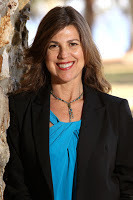 Susan U. Neal, RN, MBA, MHS: Susan’s mission is to improve the health of the body of Christ. She has her RN and MBA degrees, as well as a master’s in health science. She is a CERTIFIED HEALTH AND WELLNESS COACHwith the American Association of Christian Counselors. She published five books, the Selah award winner 7 STEPS TO GET OFF SUGAR AND CARBOHYDRATES, CHRISTIAN STUDY GUIDE FOR 7 STEPS TO GET OFF SUGAR AND CARBOHYDRATES, HEALTHY LIVING JOURNAL, SCRIPTURE YOGAa #1 Amazon best-selling yoga book, and YOGA FOR BEGINNERSwhich ranked #3. She published two sets of Christian Yoga Card Decks and two Christian Yoga DVDs that are available at CHRISTINAYOGA.COM. Her digital product HOW TO PREVENT, IMPROVE, AND REVERSE ALZHEIMER’S AND DEMENTIAis a great resource. To learn more about Susan visit her website SUSANUNEAL.COM You can also connect with Susan on FACEBOOK, TWITTER, and INSTAGRAM.
Susan U. Neal, RN, MBA, MHS: Susan’s mission is to improve the health of the body of Christ. She has her RN and MBA degrees, as well as a master’s in health science. She is a CERTIFIED HEALTH AND WELLNESS COACHwith the American Association of Christian Counselors. She published five books, the Selah award winner 7 STEPS TO GET OFF SUGAR AND CARBOHYDRATES, CHRISTIAN STUDY GUIDE FOR 7 STEPS TO GET OFF SUGAR AND CARBOHYDRATES, HEALTHY LIVING JOURNAL, SCRIPTURE YOGAa #1 Amazon best-selling yoga book, and YOGA FOR BEGINNERSwhich ranked #3. She published two sets of Christian Yoga Card Decks and two Christian Yoga DVDs that are available at CHRISTINAYOGA.COM. Her digital product HOW TO PREVENT, IMPROVE, AND REVERSE ALZHEIMER’S AND DEMENTIAis a great resource. To learn more about Susan visit her website SUSANUNEAL.COM You can also connect with Susan on FACEBOOK, TWITTER, and INSTAGRAM.
Published on July 16, 2025 22:00
July 15, 2025
Freedom to Write: Lighting the Fuse of Our God-Given Words

by Kennita (Kay) Williams
I love July. The whole month feels alive with promise—the smell of barbecue smoke drifting on warm breezes, the crackle of fireworks painting the night sky, the flags fluttering proudly in front yards.
But maybe it hits different for me because I’m a military spouse.
Freedom isn’t just an abstract ideal in my world. It’s the reason we moved every few years, the reason my husband put on the uniform and salutes the flag. It’s something we sacrificed for—something we prayed for when he deployed, something we felt deep in our bones when he was home safe.
Maybe that’s why this time of year makes me reflect on a different kind of freedom, too: the freedom to write what God has called me to say.
The Night the Fireworks Mocked Me
I’ll never forget one particular July 4th. My husband was away on training orders, and I was in a new town where I hardly knew anyone. Our boxes were still half-unpacked in the living room.
That night, I sat alone at my desk watching fireworks out the window. I was supposed to be writing a devotional piece on freedom in Christ—and I felt anything but free.
Instead, I felt trapped by:Fear of what people might think.Doubt that my voice was “good enough.”Anxiety that no one would care.
I kept glancing at the blinking cursor, hearing the dull booms outside, thinking:
Those fireworks are so sure of themselves. They just explode in beauty. No second-guessing. No apologies.
I whispered a prayer into the quiet:
Lord, I want to be that free. Free to say what You’ve put in me to say. Free to burn bright, even if it’s brief. Free to write.
I’d love to tell you the words poured out easily after that prayer.
They didn’t.
I still wrestled for every sentence.
But something in me shifted.
I realized that freedom as a writer wasn’t about having no fear. It was about being willing. Willing to light the fuse—and trust God with the explosion.
Freedom Is a Spiritual Battle
Paul says in Galatians 5:1:
It is for freedom that Christ has set us free. Stand firm, then, and do not let yourselves be burdened again by a yoke of slavery.
In my writing life, that “yoke” is often the slavery of perfectionism. Or comparison. Or fear of rejection.
As a military spouse, I’ve learned to live with uncertainty—where we’ll be stationed next, when he’ll be home, what the future holds.
But I realized I wasn’t giving myself that same grace in writing.
Instead of trusting God with the outcomes, I was trying to control everything. Make it safe. Make it perfect.
Those are chains.
And Jesus died to break them.
The Journal Entry I Didn’t Want to Share
I remember a season when I felt burned out, stretched thin by work, family, and supporting my husband’s career.I wrote a raw, unfiltered journal entry full of frustration and prayers that didn’t sound pretty.
Months later, I felt the Spirit nudge me to share it—not publicly, but with a small group of other military spouses. Women who were tired, worried, lonely.
I resisted.
God, I can’t share that. It’s too honest. It’s too messy.
But He kept nudging.
Finally, with a shaking voice, I read it aloud.
They cried. They nodded. One said: Thank you for saying what I couldn’t.
That’s freedom.
Not the freedom to say anything without care. But the freedom to be vulnerable. To be obedient.
Lighting the Fuse for His Glory
I think about those fireworks every July.
They don’t apologize for the noise. They don’t hide their brilliance. They don’t worry they’re too much.
They exist for one purpose: to light up the sky.
What if we wrote like that?
For God, who said, “Let light shine out of darkness,” made his light shine in our hearts… (2 Corinthians 4:6 NIV)
We’re called to reflect that light. Not our own perfect polish—but His transforming grace.
Practical Sparks for Anyone Who Writes
If you’re feeling stuck, here are a few “sparks” I return to again and again:Name the Chains – Write down the fears or lies holding you back. Expose them to God’s light. Pray over them.Write Anyway – Even if it’s messy. Even if no one sees it but you and Jesus. Give yourself permission to be imperfect.Share Strategically – Don’t throw your pearls carelessly, but do share when God nudges you. Your story might be someone else’s lifeline.Remember Your Why – It’s not about platform or applause. It’s about obedience. Worship. Witness.
A Prayer for Freedom
Lord, thank You for the freedom You won for us—not so we can serve ourselves, but so we can serve You boldly and truthfully. Break the chains that hold us back. Help us write bravely, light the fuse, and let our words burst with Your glory, drawing hearts toward Your love. Amen.
This month, while the fireworks burst overhead and flags wave, let’s celebrate the freedom we have in Christ—the freedom to write, to share, to testify.
Light your spark.
The world needs your light.
TWEETABLEFreedom to Write: Lighting the Fuse of Our God-Given Words from Kennita (Kay) Williams on @EdieMelson (Click to Tweet)
Dr. Kennita “Kay” Williams is a Visionary Leadership Coach, Author, Resilience Expert, and Wellness Advocate. Through her Business/Ministry, Clear Vision, she empowers leaders to navigate challenges, gain clarity, and lead with purpose. Dr. Kay’s mission is to inspire wholeness and healing. She can be contacted at www.clearvisionleader.com
Published on July 15, 2025 22:00
July 14, 2025
The Art of Rejection for Writers

by Katherine Hutchinson-Hayes @KHutch0767
Recently, I entered three prestigious writing contests—two secular and one Christian. As I waited for the results to come in, I was confident. After all, I’d poured my heart into my submissions, refined every word, and even dared to imagine what it might feel like to win. I envisioned the announcement, the applause, the emails of congratulations. But one by one, the results came in—and I didn’t place. Not even an honorable mention. Nothing.
I was crushed.
Honestly, after learning the news, which I initially took as a loss, I was a little testy with my spouse and children. Yet, I continued my day with a fake smile, pretending to shrug it off. But something in my spirit felt heavy. Discouragement clung to me like fog, and it took a while to name it—rejection.
That word lingered. It stung more than I expected, and I found myself asking why. Why did this disappointment feel so deep? Why did it leave me questioning my abilities and purpose?
That’s when God gently reminded me of the many times I’ve been chosen. Times I’ve won first place, been honored, and celebrated. He brought to mind moments I’d beaten the odds and seen the fruit of hard work and favor. And in that still, quiet whisper, I sensed Him saying, “You’ve learned how to win with grace. Now learn how to lose with wisdom.”
There’s an art to rejection.
It’s not something we like to talk about. We prefer stories of triumph. But the truth is, rejection is often the classroom where the deepest growth occurs. In this season, God is teaching me that rejection doesn’t mean I’m not gifted. It doesn’t mean my work isn’t worthy or that my voice doesn’t matter. It simply means this wasn’t the moment—and that’s okay.
Rejection can be a teacher for me as a writer, if I let it.
It’s teaching me humility. It’s helping me remember how others may have felt when I was the one being celebrated. It’s reminding me to honor others who are in their winning season. The art of rejection includes the art of celebrating others, not just tolerating their success, but genuinely rejoicing with them, learning from them, and being inspired by them.
It’s also a reminder that God’s hand is not removed from me just because someone else didn’t see my value. Man’s recognition is fleeting. God’s calling is unshakable.
And finally, rejection is refining my trust. Trust that there will be other opportunities. That my time will come again. That accolades are sweet, but they’re not the source of my identity. It’s dangerous to do so. My value was never meant to hang on a judge’s decision or a contest’s outcome.
So today, I’m choosing to embrace rejection, not as a final verdict, but as a divine invitation. An invitation to go deeper, to become more gracious, more empathetic, and more secure in who I am in Christ.
Yes, there’s an art to rejection. And if we allow it, it can become one of the most beautiful, character-shaping canvases of our lives.
TWEETABLEThe Art of Rejection for Writers from @KHutch0767 on @EdieMelson (Click to Tweet)
 Dr. Katherine Hutchinson-Hayes is a review board member and contributor to Inkspirations (an online magazine for Christian writers), and her writing has been published in Guideposts. Her work in art/writing is distinguished by awards, including the New York Mayor’s Contribution to the Arts, Outstanding Resident Artist of Arizona, and the Foundations Awards at the Blue Ridge Mountains Christian Writer’s Conference (2016, 2019, 2021). She is a member of Word Weavers International and serves as an online chapter president and mentor. She belongs to FWA (Florida Writers Association), ACFW (American Christian Fiction Writers), CWoC (Crime Writers of Color),
Dr. Katherine Hutchinson-Hayes is a review board member and contributor to Inkspirations (an online magazine for Christian writers), and her writing has been published in Guideposts. Her work in art/writing is distinguished by awards, including the New York Mayor’s Contribution to the Arts, Outstanding Resident Artist of Arizona, and the Foundations Awards at the Blue Ridge Mountains Christian Writer’s Conference (2016, 2019, 2021). She is a member of Word Weavers International and serves as an online chapter president and mentor. She belongs to FWA (Florida Writers Association), ACFW (American Christian Fiction Writers), CWoC (Crime Writers of Color),AWSA (Advanced Writers and Speakers Association), and AASA (American Association of School Administrators). She serves on the nonprofit organization Submersion 14 board and the 540 Writer’s Community board and is an art instructor for the nonprofit organization Light for the Future. Katherine hosts the podcast Murder, Mystery & Mayhem Laced with Morality. She has authored a Christian Bible study for women and is currently working on the sequel to her first general market thriller novel. Her thriller A Fifth of the Story will debut in February 2024 through Endgame Press.
Katherine flourishes in developmental editing and coaching writers. She has a twenty-year career in education, leadership, and journalism. Katherine freelances as an educational consultant for charter schools, home school programs, and churches. In this role, she has written and edited curriculum, led program development, and helped manage growth facilitating and public relations. She also works as an editor and book coach through her consulting business. Katherine provides skill, accountability, and professionalism so clients can begin, develop, and finish their writing projects for publication.
Published on July 14, 2025 22:00



